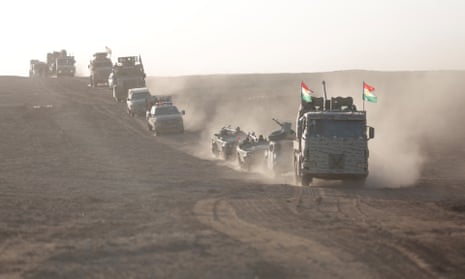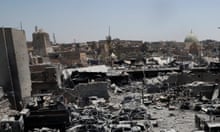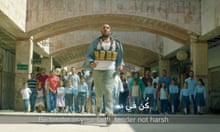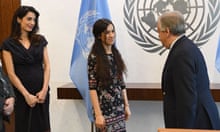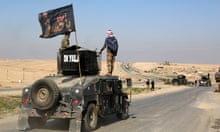Kurdish troops backed by foreign special forces including a Turkish contingent advanced on a town near Mosul on Sunday, pushing to within five miles (nine kilometres) of the northern Iraqi city as Islamic State launched another diversionary attack on the western town of Rutba.
Sunday’s offensive focused on encircling the strategic town of Bashiqa, known for both its religious diversity and production of the aniseed liquor arak, until Isis took over in August 2014.
Its liberation was expected last week when Kurdish peshmerga forces swept into the area, only to be pinned down by a barrage of suicide attacks, buildings filled with homemade bombs, and militants using tunnel networks to reappear in “cleared areas” to launch fresh ambushes.
“The suicide car bombs were very strong and we suffered many casualties,” said Jamal Bayaz, a 60-year-old peshmerga fighting to the east of Bashiqa again, after retreating last week.
“We had anti-tank ammunition, but the area was hilly and we missed the Isis units. We were lucky at least once, when a suicide bomber attacked but his vehicle broke down before he reached us.”
The Kurdish forces and their allies were taking no chances with the relaunched operation. The might and range of the coalition pushing to oust Isis from their last important stronghold in Iraq was on full display on top of Bashiqa mountain, where much of the operation was coordinated.
Two apache attack helicopters hovered over the town, despite a thick pall of smoke from tyres set ablaze by Isis to try to obscure aerial views of the town.
At a US special forces base nearby, troops were constructing earth berms for protection, their artillery pointed at Isis positions below. Near the local fighters’ forward outpost two British special forces fighters warned against photographing them as they scanned the valley for enemy fighters, before a hail of mortars flew towards Isis positions.
Jets passed overhead and unleashed regular airstrikes on the town, with coalition planes taking out at least three suicide car bombers, according to peshmerga military commanders. Five other car bombs and three suicide attackers on motorcycles were also destroyed.
At one point the pace of airstrikes was so fast that Kurdish fighters on one outpost feared their own men had been hit, and British special forces had to reassure them of coordinates.
Turkish forces, whose presence has been fiercely criticised by the Iraqi president, Haider al-Abadi, were also watching the town below the ridge-line from a base well equipped with radars and armoured vehicles.
There are 500 Turkish troops training both Sunni and Kurdish forces for the offensive at the Bashiqa base, and the Turkish prime minister, Binali Yıldırım, said on Sunday that after requests for support, Turkish tanks and artillery had joined the battle.
The government in Baghdad says they had no permission to enter Iraq and has called on them to withdraw, but Turkey has refused, saying it has a role fighting Isis. The US defence secretary, Ash Carter, who arrived in the Kurdistan regional capital, Erbil, on Sunday, has tried to cool tensions.
Last week he announced an agreement in principle to give Turkish forces a role in the operation, but since then Abadi has pointedly described the Mosul offensive as an “Iraqi battle”.
In reality the campaign, expected to be the biggest in the country since the 2003 US invasion, has drawn together a broad array of national and regional factions, many united only by their desire to push Isis out of Mosul. All agree though that the fighting will last for weeks or even months.
The peshmerga said that their operation around Bashiqa had cordoned off eight villages in an area around 38 sq miles (100 sq km) and secured a stretch of highway towards Mosul, hailing it as a “resounding success, achieved ahead of time”.
The local Isis commander for Bashiqa, Abu Faruq, was killed with five other local leaders and dozens of fighters, the statement added.
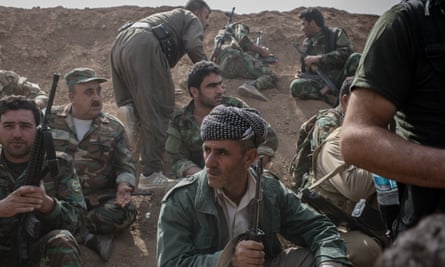
But the empty homes and streets still have to be cleared of booby traps. In Bashiqa town, a well-armed Isis unit has dug in, and there are concerns that these fighters could escape to launch another battle or suicide attacks.
“We have surrounded the town but there is resistance inside. [Isis] is fighting back with mortars and snipers, as well as heavy machine guns,” said Sabah İbrahim, a soldier with the peshmerga strike force.
“We are constructing berms now and a ditch to prevent [Isis] from fleeing, then we will move into the town and the villages around it slowly.”
Isis homemade bombs limited action on a second front to the north, a senior military source said. Kurds were waiting for coalition aircraft to take out Isis fighters in a Christian village near Tel Osqof, he told the Guardian, because braving militants and bombs together risked a devastating casualty rate.
Adding to pressure on security forces, the jihadi group has mounted two attacks in cities across Iraq over the last week.
In the western Iraq town of Rutba on Sunday three suicide car bombs launched a coordinated attack, although a spokesman for Iraqi forces said they had detonated before hitting their targets and the situation is “under control”, Associated Press reported.
Dozens of security forces and civilians died in an attack by up to 100 Isis fighters in northern Kirkuk city on Friday. The two assaults have served as a show of strength, a propaganda boost for supporters of the group and have drained attention and resources from the Mosul campaign.
A team from the UN agency for children, meanwhile, visited an area that had recently been retaken from Isis and found that conditions for children there were “very, very poor”, the agency’s Iraq representative, Peter Hawkins, said.
The team brought supplies and water expected to last seven days to residents in the area, called al-Hud, he said. They also provided immunisations against polio and measles, which he said had not been available during the more than two years of Isis rule.
